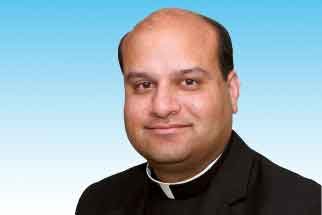
Fr. Raymond J. de Souza
Christ is the one King who won’t be deposed
The Feast of Christ the King was instituted in 1925, just as the age of kings was ending. The natural order of society — kingly rule — for millennia, was replaced by the modern state. Christians who may not have known kings were reminded that Christ was their king.
John Paul II opened gates to fall of European communism
The 25th anniversary of the defeat of European communism, dramatically punctuated by the smashing of the Berlin Wall on Nov. 9, 1989, was a historical moment of biblical proportions. The peaceful dismantling of the Soviet empire — so much so that the Soviet Union ceased to exist altogether in 1991 — was never thought to be possible, let alone to be accomplished by the very workers and ordinary people in whose name communism ostensibly ruled. Rarely is it possible to see in history the finger of God so clearly at work.
Death is not the final word
“In the sight of the world, he is now dead.”
Never too late to listen to Pope Benedict XVI
One of the world’s wisest voices was not heard during the synod fortnight in Rome. His time to speak publicly is definitively past, but it behooves the Church to listen now to what he said then.
Will the Church finally surrender to the sexual revolution?
The world has waited almost 50 years for the day, but is it on the horizon?
Changes to canonization are more than welcome
This Sunday in Rome there will be a papal Mass in St. Peter’s Basilica to give thanks for the “equivalent canonization” last April of two new Canadian saints: St. François de Laval and St. Marie de l’Incarnation. The process of “equivalent canonization” permits the Holy Father to declare a beatified person to be a saint, waiving any requirement for a miracle to be certified after the beatification, and to dispense with the canonization ceremony itself.
A Pope visits Queen’s
I was not about to miss seeing the pope on our Queen’s University campus. Perhaps not “the” pope — but a pope nonetheless, and surely the first ever papal visit to Kingston.
Pope Francis could get the Synod he didn’t want
Pope Francis has asked that Sept. 28 be a day of prayer for next month’s meeting of bishops on the family. Given the crisis in family life, the Holy Father called this extraordinary Synod to address the pastoral care of the family in the context of evangelization. However, the preparation for the Synod has been entirely dominated by one topic: Will Catholics who are divorced and have entered a second civil marriage be permitted to receive Holy Communion? At the moment they should not receive Holy Communion, as any Catholic who is in a state of mortal sin is not to receive Holy Communion.
Canada’s rich history of missionary zeal
One of the exciting aspects of Pope Francis’ pontificate is how he is making fresh the profound teaching of his predecessors. For example, the Holy Father insists that “missionary discipleship” is the Church’s fundamental identity and it forms the heart of his preaching. The Church exists to make disciples who are eager then to share their faith in Jesus with others. If the Church forgets this and turns inward, neglecting her missionary dimension, she becomes less of who she should be.
Landmark church closure a sad sign of the times
WINDSOR, ONT. - Last week I wrote about the impressive evangelical energy of young Chinese Catholics and how encouraging it was to be with them. Not two days later I was confronted with the grim reality of ecclesial life in Canada — the pockets of vitality are just that, pockets.

